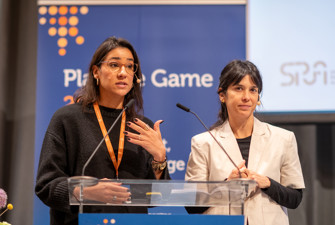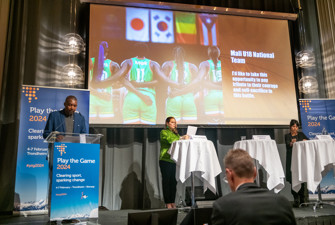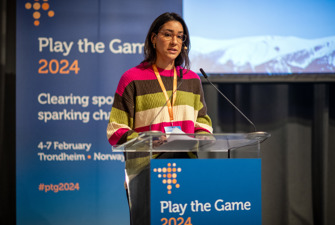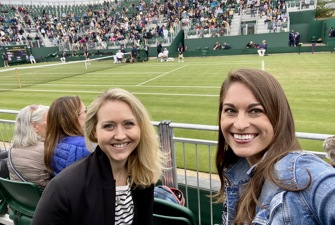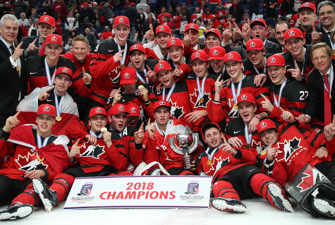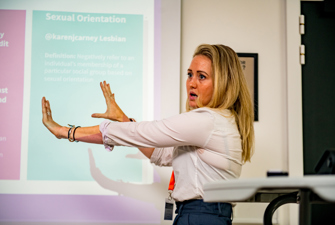Human Rights Watch: FIBA president should go after sexual abuse case in Mali
Human Rights Watch criticises the international basketball federation for not protecting victims and witnesses against intimidation and retaliation in a sexual abuse case in Mali where the national basketball federation in Mali obstructed the investigation. HRW calls for the international president to resign for overseeing institutionalised acceptance of sexual abuse.
First Afghanistan. Then Haiti. Now Mali.
Several years of media and human rights spotlight on the international football federation FIFA for failing to protect young female football players in Afghanistan and Haiti against sexual abuse have shifted this summer to the international basketball federation FIBA for its failure to protect young female basketball players in Mali.
Three months ago, The New York Times and Human Rights Watch published reports of widespread sexual abuse and harassment of some of the most talented female basketball players in the West African nation.
In September 2021, an independent investigation of the case ordered by basketball’s world governing body confirmed that at least seven coaches and officials in Mali’s national basketball federation FMBB for decades have taken part in or known of sexual abuse of female players on the country’s national U19 and U16 teams.
After the allegations were published by the New York Times and Human Rights Watch, FIBA on June 14 2021 suspended the head coach of Mali’s U19 women’s national team Amadou Bamba, coach Cheick Oumar Sissoko who is also known as ‘Yankee’, and the national basketball federation’s former vice-president Amadou Ario Maiga.
More than one month later, on July 23 2021, FIBA also suspended Mali’s basketball president Harouna Maiga based on evidence gathered by FIBA’s independent investigator of the case, McLaren Global Sport Solutions.
The evidence suggested that the national basketball president had misled the investigators about his prior knowledge of sexual abuse and harassment within the basketball federation generally and in relation to specific witnesses.
After receiving a 149-page report on the Mali case from McLaren Global Sport Solutions, FIBA will now be issuing additional suspensions against three other members of the basketball federation in Mali, pending the opening of disciplinary proceedings against coach Fanta Diallou, secretary general Seydou Maiga and vice-president Amadou Traore.
But the independent FIBA investigation has not been able to confirm New York Times’ reporting that the president of FIBA, Hamane Niang, according to witnesses knew or should have known about the sexual abuses in Mali. Between 1999 and 2011, Niang served as president of Mali’s basketball federation and as the country’s sports minister.
In June, the FIBA president, who denies any wrongdoing, stepped aside temporarily during the investigation of his former colleagues and friends in the Mali Basketball Federation. Now he is back as basketball’s top global official:
“Since the Integrity Officer has confirmed my innocence, I will now resume my official duties with FIBA,” Niang said in a statement when FIBA released its report on the Mali investigation.
“This investigation is of paramount importance, and I would like to express my personal and unconditional support to the victims. These offences must be duly prosecuted by FIBA through independent procedures.”
FIBA report: Conflicting, evasive, and untruthful testimonies
According to the FIBA report, a total of 31 witnesses including players, coaches, senior FMBB officials, former ministers of sport, and others in the Malian basketball community have been interviewed during the investigation.
The report also notes that the national basketball federation in Mali took part in several attempts to cover-up the abuse and obstruct the investigation:
“The FMBB played a role in these efforts to intimidate witnesses and other actions to impede the investigation including conflicting, evasive, and untruthful testimony of several FMBB officials, including president Maiga.”
At least 22 potential witnesses refused to speak with the investigators fearing retaliation or shame of disclosing sexual abuse allegations. But the missing testimonies from witnesses did not prevent the investigators from concluding:
“The evidence indicates an institutionalized acceptance of sexual abuse that is totally unacceptable. Current safeguarding policies and procedures including the FMBB Ethical Charter are poorly developed and grossly insufficient in encouraging the reporting of complaints and incidents and in protecting and supporting victims.”
The FIBA report paints a picture of a sports culture in Mali that resembles the sports culture in Afghanistan and Haiti where cases of sexual abuse of young female football players have been exposed in recent years.
But according to Richard McLaren, a Canadian professor and sports lawyer whose company led the independent FIBA investigation in Mali, sexual abuse of athletes is not limited to some of the poorest sport nations in the world.
“I don’t think these are isolated examples but perhaps more extreme than in other places,” McLaren says to Play the Game in a comment to his latest investigation of unethical behavior in sport.
For years, McLaren has investigated complex cases in sport, including the Russian case of state sponsored doping. But to him, investigating sexual abuse is different than investigating other cases:
“Interviewing in abuse cases is much more challenging. You need victim support possibly before and must have during the interview and counselling and support afterwards.”
McLaren: Horrors of the past kept secret
To the question what impact the intimidation of witnesses had on the investigation in Mali, McLaren answers:
“Many victims would not come forward for fear of retaliation. I understand why they would not do so and emphatise with the very difficult position they are placed in by the conduct of FMBB officials.""The other impact was that those individuals who were brave enough to come forward only did so on a confidential basis which we respected and enhanced both by referring to witnesses only as ‘witness #’ and by redacting some portions of the comments made to us to ensure no identification that could result in retaliation.”
At least 22 potential witnesses refused to speak with the investigation team. Could the team have done more to protect the witnesses so they would have come forward with their knowledge?
“When we commenced the investigation there were no safeguarding mechanism in place. To start our investigation, we had to put them in place through the efforts of FIBA. However, safeguarding can not ensure no retaliation. I understand the legitimate and very real concerns they had,” McLaren says.
“For example, some of the abuses happened over a decade ago. The victims are now married and have families. And even though they live in France or elsewhere, they have their own personal reasons related to their present family life for not coming forward which I totally understand. They have chosen to live with but keep secret the horrors of the past. This is a typical outcome of abuse and causes many victims to only come forward many decades later as we have seen in the MeToo movement in the US.”
Human Rights Watch and others have recommended the establishment of an independent global center for safe sport to better protect victims – do you support that idea?
“While I certainly would not be opposed to such an organization, I don’t think it is a very likely reality. There are a great many practical and financial issues surrounding the coming into force of such an organization. Since the 1990s sport in Canada has been trying to establish a national safeguarding system. To date they still have not done so and while attempts are underway their success remains to be seen and will still be several years away.”
FIBA complaint: Whistleblower removed from her national team
Minky Worden, Director of Global Initiatives at Human Rights Watch, supports the idea of a global center for safe sport. She is neither impressed by the outcome of FIBA’s investigation of sexual abuse in Malian basketball nor by FIBA’s safeguarding of victims and witnesses:
“FIBA’s president oversaw Mali basketball for years and did not put in place required protections for teenage players that resulted in widespread sexual exploitation, extortion and cover-ups. There was no system for reporting abuse in his own federation. So how is Hamane Niang still in his job overseeing global basketball? And why didn’t FIBA take Human Rights Watch’s warnings of retaliation into account?”
“The president of Mali’s national basketball federation had 42 days to threaten and intimidate the victims and witnesses and to obstruct the investigation before he was suspended. We warned about this risk, and that was exactly what happened.”
On June 12, Human Rights Watch warned FIBA in writing of the risks if the Mailian basketball players were not protected and ensured a survivor-centered, safe, and transparent investigation.
Play the Game has read an FIBA ethics complaint from a 17-year-old basketball player who is a survivor of sexual abuse in Mali and a whistleblower in the case but who was not protected.
After the Malian teenager brought forward direct evidence of sexual abuse to McLaren’s investigation, she was removed from her national team by the national basketball federation without being offered any help from FIBA, the complaint states.
Because of the failures and inaction of FIBA’s Secretary General, the FIBA Executive Committee and the FIBA Central Board, serious emotional, financial, and professional harm has been inflicted upon the teenager, her lawyers argue in the complaint which was sent directly to FIBA’s Ethics Panel but still hasn’t resulted in sanctions of FIBA officials.
“Intimidation, death threats, and silencing of whistleblowers and survivors happen because these men are very powerful. Their platform of a national football or basketball federation gives them a chance to go to five-star hotels and to get international jobs like Hamane Niang did. So, of course they will fight to keep their positions of power,” Worden explains.
“As we saw in the Haitian Football Federation case where the president was in power for decades, these positions in sport give you access to an enormous amount of corrupt money. But these positions also give you a chance to sexually abuse teenagers who cannot say no because their education and livelihood depend on getting a sports scholarship.”
HRW: Sports federations are responsible
To Worden, sports federations like FIFA, FIBA and the IOC are responsible for creating an environment in sport where these male leaders can abuse women and girls:
“There is nothing to stop them except the women and girls, who have to take enormous risks to come forward including stigma, shame, retaliation, and the likely end of their sports careers,” Worden says.
“None of these sport federations are set up to provide a survivor-centered investigation of sexual abuse. They don’t have female experts in interviewing survivors of abuse, they don’t provide legal support when girls are summoned by the police, they don’t have trauma supports in place, and they don’t offer physical protection.”“The McLaren investigation was not on the ground in Mali - but the abusers are, and it is naive to think powerful federation leaders won’t take revenge on young women who have blown the whistle on their crimes. As we saw in Afghanistan and Haiti, some sport federation presidents also control militias or criminal gangs who can threaten to kill athletes or family members. That is why we need a global center for safe sport and national centers for safe sport.”
Worden believes it is necessary to counterbalance the enormous power that the sport governing bodies have given these national sports presidents and head coaches.
“They have all the power and all the money, and they have no reason to change anything. It is cost-free for a national football president or a basketball head coach to sexually abuse teenage girls. It is very rare for these men to be removed from office.""It has happened twice in the case of the national football president Keramuddin Karim in Afghanistan and in the case of the national football president Yves Jean-Bart in Haiti. But both men are walking free and the teenage girls they abused still fear for their lives.”
What can be done to stop these corrupt and powerful men?
“This is not hard to solve. In schools, teachers are not allowed to take the children into the closet, marry them, or to steal money meant for education. There are basic standards and safeguarding systems to protect children that can easily be implemented, such as criminal background checks.”“That is why Hamane Niang must go. He and his cronies oversaw what FIBA itself now calls ‘an institutionalized acceptance of sexual abuse’ in his own national federation. Neither as a national basketball president and sport minister in Mali, nor as FIBA president, did he take required steps to protect the young basketball players.”
Human rights expert: A systemic overhaul is required
The British human rights lawyer Kat Craig who has specialised in helping victims and survivors of sexual abuse in sport, is not a part in the Mali case. But she has been in contact with people on the ground in Mali and she has read the FIBA report with great interest:
“Those very courageous girls and young women and civil society leaders who took huge risks have been vindicated. The report very clearly highlights extensive evidence of sexual abuse. It raises the question: How on Earth was this allowed to go on for decades when there were so many witnesses and so many perpetrators and so many victims?”
Another important question to Craig is how to rebuild trust in the FIBA system:
“The FIBA president Hamane Niang was the national basketball president in Mali and in power at the time some of this abuse is alleged to have taken place. Is the system now going to improve? The failings were so extensive that there is no doubt that it will require a systemic overhaul. Mali federation officials lied, they covered-up, and they intimidated victims. We still have an active risk that needs to be managed. I am not yet persuaded by FIBA’s statement.”
According to Craig, FIBA failed to take the course of action that was recommended by civil society experts like Human Rights Watch and as a result there are big evidence gaps in the Mali report:
“It is deeply disappointing to see that at least 22 potential and alleged victims refused to speak with the investigation team. I hope for the sake of the victims and survivors that these gaps will now be plugged,” Craig says.
To the British human rights lawyer, investigations of sexual abuse in sport repeatedly fail to meet certain procedural standards and safeguards. They fail to take a victim and survivor-centered approach where they understand and acknowledge how difficult and frightening and dangerous it is to report sexual abuse. But she has a solution:
“Either sport governing bodies need to clean up their act and getter better at it or we need to have a centralised entity that is going to take responsibility for doing this in an independent, expert, and safe way,” Craig argues.
“An organisation like that can also help rebuild the victims’ and survivor’s lives. We now have a group of players in Mali, like we have a group of players in Afghanistan and Haiti, all of whom had to sacrifice everything to highlight sexual abuse and try and keep women and girls safe in the future. That should not be their responsibility. It cannot be right.”
How many cases of sexual abuse do you think we will see before the sport governing bodies react?
“FIFA is leading a consultation to create an international safeguarding entity. I hope that other international federations will get behind that. We are seeing multiple cases of sexual abuse in football, but I am in no doubt that we will now see the same in basketball. There are allegations in Kenyan basketball, and I have been contacted by coaches and journalists regarding other national basketball teams,” Craig says.
“I have no doubt that the Mali case is only the tip of the iceberg when it comes to sexual abuse in basketball in the same way that the US Gymnastics case was in gymnastics and the UK and Afghanistan cases was in football. It is time for sport to wake up, roll up its sleeves and tackle this problem once and for all.”


